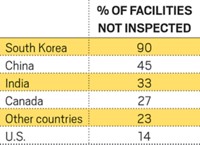Advertisement
Grab your lab coat. Let's get started
Welcome!
Welcome!
Create an account below to get 6 C&EN articles per month, receive newsletters and more - all free.
It seems this is your first time logging in online. Please enter the following information to continue.
As an ACS member you automatically get access to this site. All we need is few more details to create your reading experience.
Not you? Sign in with a different account.
Not you? Sign in with a different account.
ERROR 1
ERROR 1
ERROR 2
ERROR 2
ERROR 2
ERROR 2
ERROR 2
Password and Confirm password must match.
If you have an ACS member number, please enter it here so we can link this account to your membership. (optional)
ERROR 2
ACS values your privacy. By submitting your information, you are gaining access to C&EN and subscribing to our weekly newsletter. We use the information you provide to make your reading experience better, and we will never sell your data to third party members.
Business
China Threatens Plant Closures
Agency gets tough on drug firms that don't follow strict manufacturing rules
by Jean-François Tremblay
May 31, 2004
| A version of this story appeared in
Volume 82, Issue 22

China's State Food & Drug Administration (SFDA) is preparing to order the closure of about 1,000 substandard pharmaceutical plants after July 1, the deadline for drug companies to have their plants inspected and approved by the agency.
SFDA's estimate of how many units will be closed down is based on the number of plants that have failed to obtain approval until now, says Ansen Chiew, international business manager for Zhejiang Cheng Yi Pharmaceutical. Cheng Yi earned its plant approval two years ago.
Emulating the practices of developed countries, China introduced its own code of Good Manufacturing Practices in 1998. But it was only three years ago that SFDA started to inspect pharmaceutical plants throughout China, Chiew says. There are about 6,000 pharmaceutical plants in China, according to Hardy Chan, executive vice president of Taiwanese pharmaceutical ingredients producer ScinoPharm.
Inspections are urgently needed. Well-run and responsible Chinese drug companies have faced unfair competition from substandard operators that in some cases produce counterfeit drugs containing no active substances, Chan says. Chinese consumers are increasingly turning to expensive foreign-made drugs because they distrust those that are made locally, he says. ScinoPharm itself runs a drug intermediates plant near Shanghai.
One source says SFDA has not conducted very thorough inspections because it wants to limit layoffs from the closure of substandard plants.
Counterfeit drugs kill several people every year in China. Thirteen babies died this spring in Anhui province after consuming fake milk powder.



Join the conversation
Contact the reporter
Submit a Letter to the Editor for publication
Engage with us on Twitter